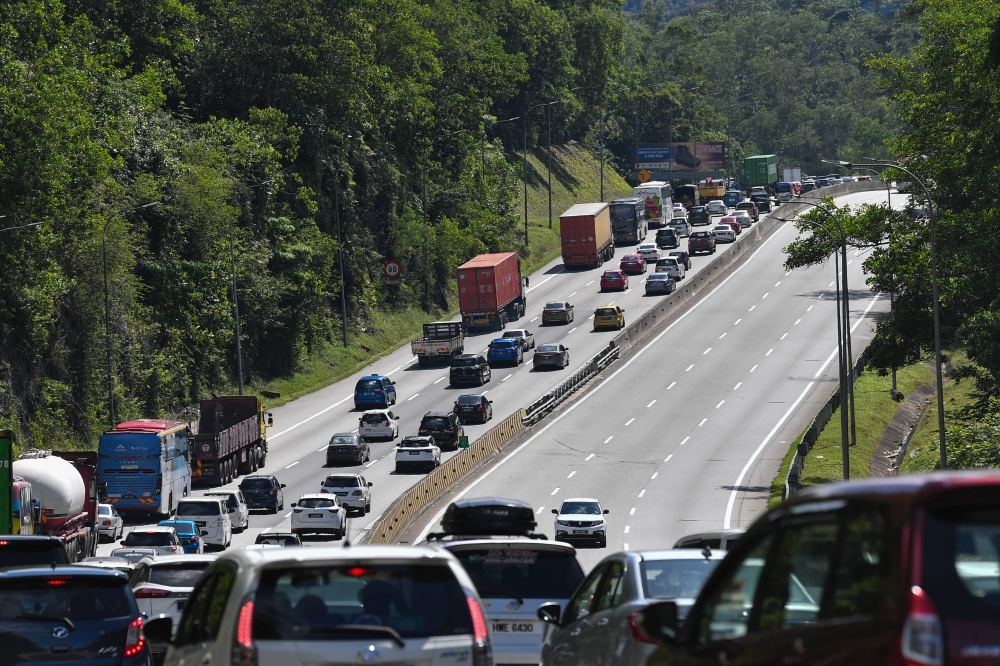OCTOBER 3 ― One of my aunts has an “iron rule” when on the highway: Never drive near a lorry. She either overtakes the lorry or she ensures she’s waaaaay behind the dude.
I’ve always felt her precautionary behaviour was a bit overkill but after seeing news story after news story of major road accidents caused by lorries (most recently at Putrajaya about two weeks ago which resulted in the deaths of two motorcyclists), I’m starting to think my aunt has a point.
Of course cars can and have also caused accidents, but given the sheer size of lorries, one mistake from the driver or one failure in the vehicle and we’ve got chaos on a potentially massive scale.
And judging from what I’ve seen driving along the North-South highway, there are always three or four mega-ton trucks who look as if they’re super-excited to get to their destination.
Surely I’m not the only one who, when driving around 110 kph or slightly faster, has seen a colossal vehicle transporting fuel (or what-not) in my rearview mirror speeding towards me, and eventually overtaking me.
Omg, if I’m doing 110 and this giant is flying past me, what speed must the drive be at?
Even worse, how many of us have seen super-trucks drive as if they were racing each other? C’mon, you know you’ve seen those, right?
Mega-trailers transporting god-knows-what weaving in and out of traffic like they are playing Gran Turismo or something! When this happens, my aunt’s advice sounds positively urgent.
Whatever else you take away from this article, I think we all agree that if we witness accelerator-friendly trucks on the road with F1 vibes we should immediately slow down and let them get FAR away from us.

The driver is the #1 culprit
The Malaysia Tipper Lorry Operators' Association, almost immediately after the Putrajaya crash, came out and appealed to everyone not to place the blame solely on lorry drivers.
It claimed that many issues involving operators and lorry drivers were believed to be caused by confusing guidelines and laws pertaining to loaded weight (BDM) and unladen weight (BTM).
Its chairman Datuk Michael Loo Leep Chye also said that arresting the driver is only a short-term solution which doesn’t benefit anyone.
I reckon he is correct that there are other factors to consider but incorrect in what he’s denying ie that the lorry driver isn’t the primary culprit. Contrary to what he’s implying, clearly the lorry driver has to be arrested and charged.
I mean, even if the loaded weight is fine, the truck is perfectly maintained and the roads are in pristine condition, there will still be joker drivers who do not give two damns about the dangers of speeding.
And we see many of these drivers on the road, every day.
If these guys are not arrested for their horrific driving, I frankly can’t see how justice is even remotely done, can you?
In fact, the problem seems not to be their arrest — it’s the lack of arrests before accidents occur. How many drivers will continue to handle their giant trucks like speed-demons with impunity... until people die?
Given such irresponsible driving, especially when handling massive vehicles, it really isn’t a matter of IF but WHEN another tragedy will occur.
Beyond the driver
Yet, okay, Loo does have have a point in that lorry accidents do appear to be a systemic problem involving many parties.
There is the issue of ensuring that loaded weight doesn’t exceed limits, of the authorities issuing clear guidelines and (not?) enforcing them adequately, of greedy customers demanding their goods be transported double time adding to the pressure of lorry operators cutting corners when it comes to vehicle maintenance and driver selection, of the risk of poor lorry tyres, of the operators themselves having to think about their own bottom lines (thereby compromising on maintenance and/or driver stress).
The driver isn’t the only player involved.
And we can’t just remove lorries from Malaysian roads entirely and very few of us are either lorry drivers or lorry operators and goods and cargo still have to be transported.
I confess I don’t really have an answer, apart from the usual: The government must step up enforcement. The Transport Ministry also needs to be extra vigilant in policing these lorry operators and their drivers. Not any Tom, Dick or Harry should be allowed behind the wheel.
Would it help to place heavy penalties on the lorry operator and their clients in the event of an accident? In other words, to spread skin in the game throughout the system?
This will surely drive costs up because it’ll then require operators and customers to give more of a damn about how the goods involved are being moved.
Yet, if more parties care a bit more, perhaps fewer lives need be lost.
Another suggestion is to have (more?) lorries be installed with speed-limiters which prevent the drivers from going above a certain speed.
In the meantime, everybody, maybe we should treat lorries the way we treat pick-pockets: Use distance as our best defence.
* This is the personal opinion of the columnist.






















